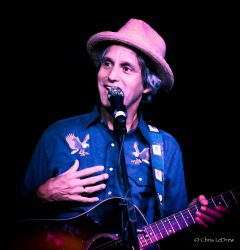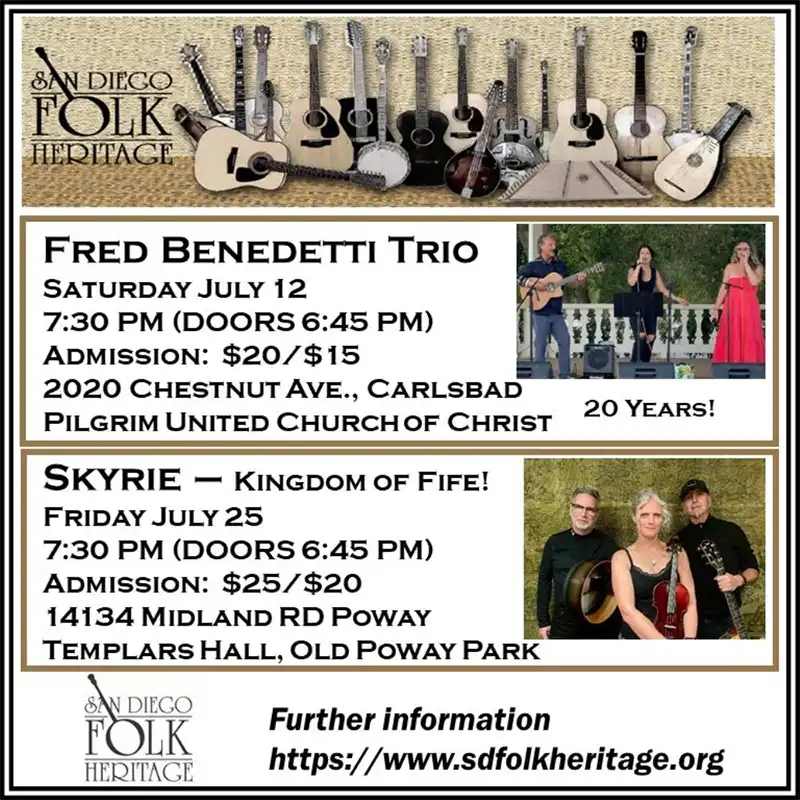Featured Stories
THE PULSE ON POLTZ: Steve Poltz composes his first film soundtrack with Running Wild

Steve Poltz. Photo by Chris LeDrew.
Twenty-five years ago Steve Poltz oozed upon the San Diego music scene with his musical partner Rob Driscoll and created an incomparable commotion with a roving band of lunatics called the Rugburns. Almost immediately Poltz forged a singular reputation as an irreverent storytelling punk rock-loving troubadour who delighted at thumbing his nose at society’s most uptight conventions, frequently deploying low-brow humor as a weapon. Poltz is one of life’s agent provocateurs, whose mission appears to be staring down his demons, facing his fears, entertaining the masses, and spreading his ever-loving message of anarchistic weirdom to anyone within the reception of his peculiarly vitalizing energy field. Judging by the numbers and the enthusiasm of his tribe, there are quite a few natives grokking together on the same wavelength as Steven Joshua Joseph Jeremiah Poltz.
The Rugburns split in 1996 and since that time Poltz has distinguished himself with an absurd array of solo releases that are diversity personified, running the gamut of major label introspection (One Left Shoe) to the maximum low-fi independence of Answering Machine, a 60-song exercise of tunes written in 45-second bursts and recorded over the telephone. His ever-expanding pallet includes refining the techniques of singer-songwriter sensitivity with keen narrative exposition, which usually comes with a serrated twist. His one-time collaborator Jewel (with whom Poltz composed the adult contemporary smash “You Were Meant for Me”) refers to this process as “Poltzerizing.” Poltz has long confessed to a deep and abiding love for the music of James Taylor, but his instincts often tell him to throw in a line of profanity à la Charles Bukowski amongst the saccharine.
On rare occasions Poltz manages to curb his more perverse instincts and he has done so to great effect on his latest project, the soundtrack to the brand new documentary film titled Running Wild: The Life of Dayton O. Hyde. Running Wild is a captivating meditation on the life and work of author and wild horse activist Dayton O. Hyde by filmmaker Suzanne Mitchell. It is Poltz’s first foray into the world of composing a film score and he is excited to talk about it.
So, you just got back from a promotional junket on the east coast to promote Running Wild. How did that go?
It was good. The premier was October 4 in New York and then we did a string of ten film festivals. Slamdance, Cinequest, Palm Beach, Sarasota, Sedona…
Were you in attendance for all of those screenings?
Yes, I went to every film festival, which is unusual for the composer to attend, but the director of the film [Suzanne Mitchell] really wanted me to play the end-credits song live. After the credits were done rolling I would come out and surprise the audience and she would introduce me and then I would play “Song for Hawk” and then they would bring out Dayton. We would do a Q&A with all of us and it worked really well.
After the film screened people would literally start crying. It’s skewing to this real horse-loving audience. They just saw this man who is very moving and inspirational. To leave your family when you’re in your 60s to start a wild horse sanctuary across 15,000 acres in South Dakota — this is unheard of.
So, they’ve just seen this film and they’re moved by Dayton’s story, and then all of a sudden here’s the guy who did the soundtrack singing the song you just heard. It’s almost like art becomes life, and then we would always surprise the audience with Dayton coming out after the song. We would hide him beforehand. He’s an 88-year-old cowboy and we would hang out together. I would explain to him about hipster coffee houses and we would laugh and talk about horses. I was sort of his caretaker, ’cause he’s in a wheelchair. I got used to pushing him around.
How did you get involved in this project?
It was about 11 years ago. I had a show in New York City and I was at Fordham University on WFUV promoting the show. And Suzanne Mitchell, the director, always has her station tuned to WFUV. It’s sort of like listening to KCRW.
So she hears me and I’m being really funny and everybody thinks it’s clicking and the girl interviewing me is laughing and sometimes when you’re on the radio, you just know that you’re hitting it out of the park. Suzanne hears me and says, “I have to go meet this guy. I’m working on a project that he would be perfect for. Somehow our lives need to intersect.” So, she drove to the gig that night, walks in, and I’m drunk on stage with my pants around my ankles standing on the bar. And afterwards she comes up and says, “I heard you on the radio,” and says that she wants to do a show called “Pulse on the Poltz” or something, I can’t remember.
What was that going to be like?
Suzanne said, “I just want to go out and follow you on the road and see what happens.” At the time I had this big schtick I was doing: we needed to kick Muddy Waters and the Rolling Stones out of the Rock and Roll Hall of Fame and put in Styx. I would walk up to people in the street singing Styx songs and ask if they would sign my petition and she’s like, “This guy is out of his mind.” And the people I would encounter are like “hell, no” and “screw you,” just getting pissed off at me and every once in awhile I would meet someone with a great mullet going “Yeah!”
People would actually take you seriously?
Yeah, it was great. Suzanne filmed a couple of shows on the road and then she started producing “The Hugh Thompson Show.” It was an internet talk show and I was in the band. I was like Paul Schaefer and I would make up songs for each guest. We filmed it in the Maury Povich Studios and there’s hundreds of episodes up on the AT&T website.
This was in New York?
Yes, it was a live talk show and I would fly out once a month for a week at a time. I would write songs — 12 songs a day, ’cause we would tape all these episodes, so I would have to sit with the band and teach them songs. We made a theme song for “The Hugh Thompson Show” and then I would write a song for each one of our guests. It was an insane time in my life.
And that’s how you began your working partnership with Suzanne?
Yes, and she said to me, “I’m working on this project about this cowboy and as soon as I get the funding I would like you to do the soundtrack.” At the time she had already put 300 grand into it and the film cost around 700 grand. I never really thought it would happen, but about a year and a half ago she got the funding and she flew me out to meet Dayton and that’s how it all started out.
They flew me out to South Dakota in the middle of this already hectic touring schedule. You gotta remember that when I quit drinking [November 30, 2004] I got even more energetic and I was already touring a lot but then I just really kicked it into high gear and my addiction became work because it’s just so much fun to be on the road. To this day I can tell you that I will never retire. Like I could win the lottery tomorrow and I might buy something, but I don’t know what it would be. I have everything I want.
What are your thoughts on the way the soundtrack worked out?
For some reason I really like how the record goes. It’s like something you can drive around and listen to as a record. I didn’t think I’d be into it but I really love the guitar picking things and I’ve always wanted to do some instrumental stuff. I keep getting messages from people — I never get this many messages and I go, “Why is this happening?” and Suzanne goes, “Because you don’t have any [profanity] — you’re not wrecking your own music.” And I said, “There’s something to be said for being more commercial isn’t there?”
Commercial in the sense that you weren’t shooting yourself in the foot?
Yeah. Like maybe I’ve purposefully done that to totally sabotage myself. Maybe a shrink could look into that and say what that’s about. [laughs] But I don’t think it goes that deep, I think it’s simply this: I’m just a goofy motherf****r and I find humor in a lot of silly stuff and I don’t believe in editing it out when it happens. If it makes me laugh, it’s good enough for me. The one thing I have learned is if it makes me laugh it’s going to make a certain group of other people laugh. Why do you think South Park has such a big following?
Why do you think you have such a polarizing effect on people?
Because it’s so different. And, I’ve learned, that it’s a good thing to cause a reaction. I look at it this way: music has to have a call to action; otherwise it’s just boring milquetoast. If people aren’t coming up to you after a show and asking, “When are you coming back?” you’ve got a problem. You better go back to the drawing board or you’re happy playing to five people and if so, more power to you, that’s good, too. But I didn’t get into this to play to five people. I got into this to make a living.
In that sense you already did win the lottery.
Yes, so I did win the lottery. So I’m able to do this. But I really believe that if you trust your inner voice and what you write is honest to the way you feel, that is how you build a following. Because there are going to be other people that are vibrating on the same wavelength as you and they’re going to feel it. And that’s why I say that’s where you get your call to action from, that’s where stuff starts happening. And you have to be risky, you have to say this might not go over but it feels right to me and be kind of scared to put it out there.
What’s on the horizon?
I’m going to be playing some festivals up in Canada in February, in the heart of the winter. I’ll be at Folk Alliance this year, I’ll be at South by Southwest. I go every year to SBSW. It’s a tradition, I know so many friends, it’s fun. Folk Alliance I love because it all takes place in one hotel.
You would love the Steel Bridge Song Festival in Sturgeon Bay, Wisconsin.*
And I’m really good at that and I just did a really cool festival called the Sisters Folk Festival. I’m made for Steel Bridge, I can tell. I get off on being with people and writing songs with them and I love it when somebody says, “No, not that line!” I love being challenged and I love sitting and writing a song and saying, “Yeah, yeah! Go with that!” I think I’m really good at co-writing because I’m not afraid to be an idiot. Because it’s hard to be cool, man. Being cool takes a lot of work. It’s cooler to not be cool.
*The Steel Bridge Song Fest is covered extensively in the August 2013 issue of the San Diego Troubadour.
For a deeper look at the soundtrack for Running Wild, see the review in this issue.





